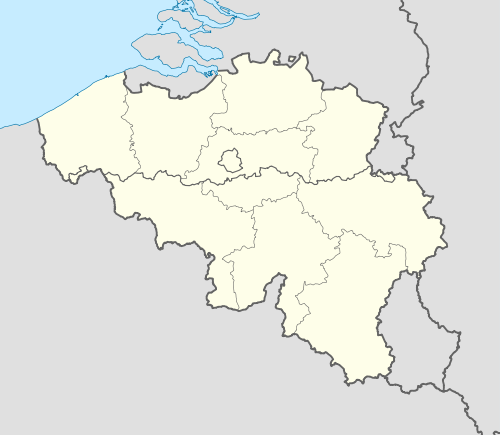Football at the 1920 Summer Olympics
| Men's football at the Games of the VII Olympiad | |||||||
| Venue | Olympisch Stadion | ||||||
|---|---|---|---|---|---|---|---|
| Date | August 28–September 5 | ||||||
| Competitors | 190 from 14 nations | ||||||
| Medalists | |||||||
The football at the 1920 Summer Olympics, was one of the 154 events at the 1920 Summer Olympics, held in Antwerp. It was the fifth time association football was on the Olympic schedule. The tournament was contested by 14 teams, with host country Belgium winning the gold medal. Spain won silver, while the Netherlands won the bronze medal.
Venues
| Antwerp | Football at the 1920 Summer Olympics (Belgium) |
Antwerp | |
|---|---|---|---|
| Olympisch Stadion | Stadion Broodstraat | ||
| Capacity: 35,000 | Capacity: Not known | ||
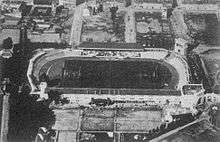 |
|||
| Ghent | Brussels | ||
| Jules Ottenstadion | Stade Joseph Marien | ||
| Capacity: Not known | Capacity: Not known | ||
Squads
Tournament
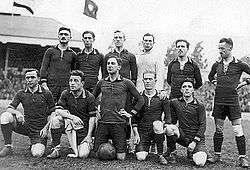
14 teams entered the competition which was organized on a knockout basis. 12 teams entered the first round, with the 6 winners joining the host nation (Belgium) and France, in the quarter-finals.
Perhaps the most far-reaching of the results was that which saw Norway defeat Great Britain in the first round. The British delegation were concerned with the rise in 'professional' opponents within the international game. As Bernard Joy in Association Football (1960) was to write: "Out of pocket expenses were paid far in excess of the reimbursement for hotels and travelling. ... [Payments] for time lost from work, were made for playing and training, and teams were taken off for intense preparation together. Whatever the reason or excuse, thinly-veiled professionalism was rampant." Ironically Norway were not a professional side. The complaint was, however, clearly addressed at a growing trend within the game.
Czechoslovakia, participating in their first international tournament, cruised to the final, inflicting heavy defeats on Yugoslavia (who played their first ever international match in the competition), Norway, and France. Belgium beat a talented Spain and then the Netherlands on their way to the final. Belgium won the gold medal by default after Czechoslovakia walked off in protest during the final, unhappy with the performance of the English referee, John Lewis.[1] The Bergvall System[2] was used to determine second and third places. The beaten quarter-finalists played-off, Spain emerged triumphant overcoming Sweden 2-1 and Italy 2-0. Ordinarily, Spain would then have played the beaten finalists, but Czechoslovakia had been disqualified from the tournament. Spain thus advanced straight to the silver medal match against the Netherlands, beaten in the semi-finals by gold medallists Belgium. Spain won 3-1.
Results
First round
August 28, 1920 10:00 |
| Czechoslovakia |
7–0 | |
|---|---|---|
| Vanik Janda Sedláček |
Report |
August 28, 1920 17:30 |
| Sweden |
9–0 | |
|---|---|---|
| Olsson Karlsson Wicksell Dahl |
Report |
Quarter-finals
August 29, 1920 10:00 |
| Netherlands |
5–4 (a.e.t.) | |
|---|---|---|
| Groosjohan J. Bulder De Natris |
Report | Karlsson Olsson Dahl |
Semi-finals
Gold medal match
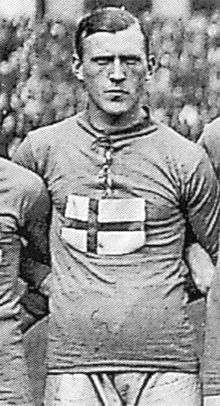
The final was highly controversial and remains the only occasion in which an international final has had to have been abandoned. Belgium was awarded the gold medal by default after Czechoslovakia walked off the field in the 40th minute of the final when Czech left-back Karel Steiner was ejected.
They were unhappy with the performance of the 65-year-old English referee, John Lewis, who had already refereed the Belgian semi-final victory over the Netherlands, a match observed by the Czechs (it had taken place on the same day and in the same stadium as their own victory against France), as well as the English linesmen, Charles Wreford-Brown and A. Knight, who had allowed a contentious second Belgian goal in the 28th minute that Henri Larnoe had converted.
The Czechs protested the result of the final. Their protests, translated from the original French, were as follows:
1. We were allocated an English linesman, which is in contradiction with the rules which state that each participating nation has the right to one of both linesman. This violation of the rules was prejudicial to us during the game, because the English linesman was not impartial and this is why we seek the cancellation of the match. Immediately after the game we brought this notice to the attention of M. Rodolphe Seeldrayers.
2. The majority of the decisions of the referee Mr. Lewis were wrong and it was obvious that it gave the public the wrong impression about our game. Also both Belgian goals were the result of incorrect decisions of the referee and we seek a rigorous investigation on that point.
3. During the match, Belgian soldiers were introduced to the crowd until they circled the pitch and because of their provocative presence our players were unable to play their normal game. As a result of the very regrettable incident at the end of the match when there was a pitch invasion led by the soldiers and our national flag was insulted we will not participate until we have received an apology from the (Belgian) soldiers.[3]
Czechoslovakia's protests were dismissed, and they were disqualified from the tournament.
Consolation round
Second place tournament first round
Second place tournament second round
Second place final
Eighth-place match
September 2, 1920 10:00 |
| Egypt |
4–2 | |
|---|---|---|
| Abaza Allouba Hegazi |
Report | Dubravčić Ružić |
Goalscorers
- 7 goals
-
 Herbert Carlsson (Sweden)
Herbert Carlsson (Sweden)
- 6 goals
-
 Antonín Janda (Czechoslovakia)
Antonín Janda (Czechoslovakia)
- 5 goals
-
 Ber Groosjohan (Netherlands)
Ber Groosjohan (Netherlands)
- 4 goals
-
.svg.png) Robert Coppée (Belgium)
Robert Coppée (Belgium) -
 Jan Vanik (Czechoslovakia)
Jan Vanik (Czechoslovakia) -
 Félix Sesúmaga (Spain)
Félix Sesúmaga (Spain)
- 3 goals
-
 Otakar Mazal (Czechoslovakia)
Otakar Mazal (Czechoslovakia) -
 Jaap Bulder (Netherlands)
Jaap Bulder (Netherlands) -
 Albin Dahl (Sweden)
Albin Dahl (Sweden) -
 Albert Olsson (Sweden)
Albert Olsson (Sweden)
- 2 goals
-
.svg.png) Henri Larnoe (Belgium)
Henri Larnoe (Belgium) -
.svg.png) Sayed Abaza (Egypt)
Sayed Abaza (Egypt) -
 Jean Boyer (France)
Jean Boyer (France) -
.svg.png) Guglielmo Brezzi (Italy)
Guglielmo Brezzi (Italy) -
 Einar Gundersen (Norway)
Einar Gundersen (Norway)
- 1 goal
-
.svg.png) Mathieu Bragard (Belgium)
Mathieu Bragard (Belgium) -
.svg.png) Louis Van Hege (Belgium)
Louis Van Hege (Belgium) -
 Josef Sedláček (Czechoslovakia)
Josef Sedláček (Czechoslovakia) -
 Karel Steiner (Czechoslovakia)
Karel Steiner (Czechoslovakia) -
.svg.png) Hassan Allouba (Egypt)
Hassan Allouba (Egypt) -
.svg.png) Hussein Hegazi (Egypt)
Hussein Hegazi (Egypt) -
.svg.png) Zaki Osman (Egypt)
Zaki Osman (Egypt) -
 Henri Bard (France)
Henri Bard (France) -
 Paul Nicolas (France)
Paul Nicolas (France) -
 Fred Nicholas (Great Britain)
Fred Nicholas (Great Britain) -
.svg.png) Emilio Badini (Italy)
Emilio Badini (Italy) -
.svg.png) Adolfo Baloncieri (Italy)
Adolfo Baloncieri (Italy) -
.svg.png) Enrico Sardi (Italy)
Enrico Sardi (Italy) -
 Jan de Natris (Netherlands)
Jan de Natris (Netherlands) -
 Arne Andersen (Norway)
Arne Andersen (Norway) -
 Einar Wilhelms (Norway)
Einar Wilhelms (Norway) -
 Domingo Acedo (Spain)
Domingo Acedo (Spain) -
 Patricio Arabolaza (Spain)
Patricio Arabolaza (Spain) -
 Mariano Arrate (Spain)
Mariano Arrate (Spain) -
 José María Belauste (Spain)
José María Belauste (Spain) -
 Pichichi (Spain)
Pichichi (Spain) -
 Ragnar Wicksell (Sweden)
Ragnar Wicksell (Sweden) -
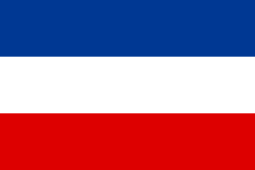 Artur Dubravčić (Yugoslavia)
Artur Dubravčić (Yugoslavia) -
 Jovan Ružić (Yugoslavia)
Jovan Ružić (Yugoslavia)
Medalists
References
External links
| Wikimedia Commons has media related to Association football at the 1920 Summer Olympics. |
- Olympic Football Tournament Antwerp 1920, FIFA.com
- RSSSF - 1920 Olympic Games
- Article about the 1920 Olympic football tournament
- 1920 Antwerp's Olympic Football Tournament
- The VII Summer Games - Football
